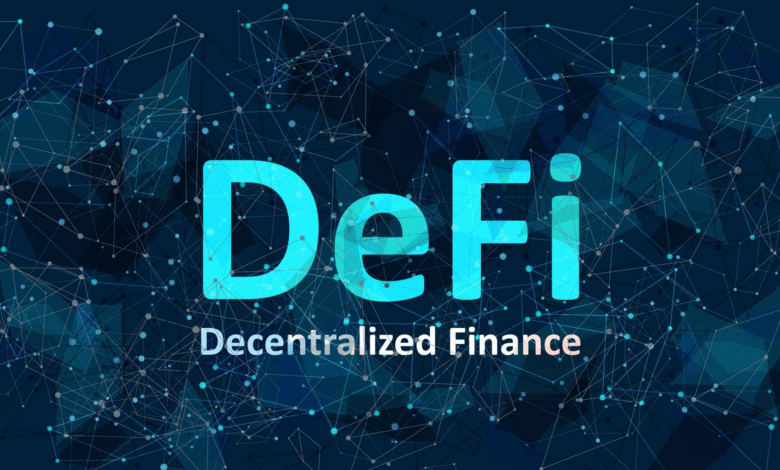DeFi Lending for Beginners, Safe UK Options Explained

Decentralised finance, or DeFi, has risen swiftly from a modest aspect of blockchain technology to a popular alternative to regular banks. Investors in the UK seeking passive income, financial freedom, and access to financial products without the need for intermediaries are particularly interested in decentralised finance (DeFi) lending. People can offer or borrow digital assets in a decentralised, trustless environment through DeFi Tokens Drop 40%, leveraging blockchain protocols and smart contracts. However, if you’re unaware of the hazards, they may be alarming. This is especially true for individuals new to finance who seek straightforward tools to use.
How DeFi Loans Work
DeFi financing is based on smart contracts, which are agreements written on blockchain platforms like Ethereum, Binance Smart Chain, and Polygon and executed autonomously. These contracts facilitate easier trading and lending between individuals, eliminating the need for a third-party intermediary. DeFi lending platforms don’t employ credit scores or lengthy approval processes to manage risk. They utilise overcollateralisation instead. To borrow a given quantity of DAI or USDC, a person may need to deposit ETH or BTC worth 150% of the loan amount. This way, lenders are shielded from default and volatility.
When lenders lend their crypto assets to liquidity pools, they receive interest payments. On the other hand, borrowers pay interest on these loans in exchange for the money. Computers use algorithms to calculate interest rates, and they alter them dependent on how much money is available and how much people want it. Anyone with a crypto wallet can participate in this structure’s more open and dynamic financial environment.
Safe options are new to the UK for getting DeFi loans
Newcomers to the UK should prioritise safety. Many DeFi systems are recognised for being secure and user-friendly. Aave, Compound, and Yearn Finance are all fantastic places to start if you’ve never used cryptocurrency before. Their paperwork and smart contracts have been examined. For example, Estonia’s digital asset legislation applies to Aave, and the platform features an open governance architecture that enables token holders to vote on changes to the protocol. On the other hand, Compound is popular because it works nicely with decentralised accounts like MetaMask and Coinbase Wallet.
Yearn Finance’s automatic yield farming technologies make it easy to invest in DeFi. Individuals just starting out can deposit stablecoins like USDT or USDC into vaults that offer the best returns across multiple platforms. Often, these platforms can integrate with hardware wallets like Trezor and Ledger. This provides UK users with enhanced security against phishing attacks and the leakage of private keys.
People living in the UK should also consider ways to ensure that the rules are consistent across the board. Platforms like Maple Finance and TrueFi include built-in Know Your Customer (KYC) solutions. This may be of interest to anyone seeking a straightforward and legal approach to getting started with DeFi lending. But the FCA is still working on comprehensive regulation. These standards suggest that people are increasingly seeking better security and transparency.
Things to Keep in Mind About Regulations in the UK
Initially, the UK’s Financial Conduct Authority (FCA) was sceptical of DeFi, but over time, it has become more open to it. The FCA has warned consumers about the risks associated with decentralised lending systems, particularly regarding token volatility, smart contract vulnerabilities, and the lack of options in the event of a hack. As a result, many DeFi protocols have enlisted security firms like Certik and Quantstamp to conduct their audits. Users should read the FCA’s rules on cryptoassets or updates from HM Treasury to stay informed about how the rules are evolving.

The UK government’s objective of becoming a “global hub for crypto” could have a significant impact on DeFi loans in the future. Following recent discussions in Parliament about regulating digital assets and classifying stablecoins, formal clearance is expected shortly. This clear set of guidelines could make people feel more at ease and encourage more small and big investors to embrace the technology.
How to Choose the Best DeFi Wallet
It’s essential to select a wallet that’s secure and compatible with DeFi loans. Many popular non-custodial wallets, such as MetaMask, Trust Wallet, and Argent, can be directly linked to most lending services. People in the UK who are concerned about their data privacy and cyber safety can use hardware wallets, such as the Ledger Nano X, to add an extra layer of protection. These devices store the private keys, which can be used with software wallets to approve transactions securely.
You should also consider whether the wallet is compatible with Layer 2 options, such as Arbitrum or Optimism. These networks lower petrol prices and transaction delays, which makes it easier and cheaper to receive DeFi loans. By 2025, more platforms in the UK are likely to adopt multi-chain approaches to meet the expectations of consumers who want them to be able to develop and work more effectively.
Risks and how to lower them
There are both advantages and disadvantages to decentralised finance (DeFi) loans. Bugs in smart contracts, temporary loss, and protocol bankruptcy can all result in the loss of assets. The Wormhole attack in 2022 stole more than $300 million, highlighting the importance of thorough research. Beginners should only use platforms that have been thoroughly vetted. Start with stablecoins to minimise risk, and utilise risk assessment tools like DeFi Score or Rekt News.
Nexus Mutual and InsurAce are two examples of insurance systems that provide decentralised coverage if smart contracts fail. People in the UK can buy these benefits with ETH or DAI, which makes their money even safer. Some platforms also offer structured commodities that allow customers to entrust their assets to professional managers. This means that users don’t have to watch them all the time.
What Stablecoins Have to Do with Lending in DeFi
If you’re new to DeFi loans, stablecoins like USDC, DAI, and Tether are usually the best assets to start with. They are less likely to lose value when the prices of cryptocurrencies like Bitcoin and Ethereum fluctuate because their value is tied to traditional money. DeFi and Web3 Growth, People in the UK demand GBP-pegged stablecoins more than ever. Projects like Poundtoken (GBPT) are exploring how to develop solutions that cater to British customers.
It’s also easier to get in with stablecoins. Most lending services will let you utilise them as collateral or as loan assets. This two-in-one feature makes it easier to run a business and helps new users learn faster. Stablecoins will be the building blocks of the UK’s future digital financial systems. They are stable because they have programmable money and mechanisms in place to maintain stability through algorithms.
